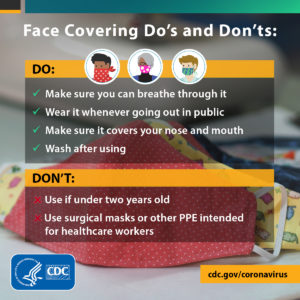Facing the Risk for Serious Illness from COVID-19
Home » For Patients old » Living with NETs » Coronavirus Disease (COVID-19) Outbreak » Facing the Risk for Serious Illness from COVID-19
Many people who are living with cancer, including cancer patients and cancer survivors, are wondering whether they face an increased risk for serious illness from COVID-19. We’ve compiled the latest information from trusted resources to help you understand your risk for serious illness form COVID-19.
Who is at increased risk for serious illness from COVID-19?
U.S. Centers for Disease Control (CDC) reports that people of any age who have the following underlying medical conditions are at increased risk for severe illness from COVID-19. Based on available information to date, this includes:
- Cancer (added on July 17, 2020)
- Chronic kidney disease
- COPD (Chronic Obstructive Pulmonary Disease)
- Immunocompromised state from solid organ transplant
- Obesity (body mass index [BMI] of 30 or higher)
- Serious heart conditions, such as heart failure, coronary artery disease, or cardiomyopathies
- Sickle cell disease
- Diabetes (Type 2)
Who might be increased risk for severe illness from COVID-19?
Currently, there are limited data about the impact of underlying medical conditions on the risk of severe illness from COVID-19. Based on available data, the CDC reports people with the following conditions might be at an increased risk for severe illness from COVID-19:
- Asthma (moderate-to-severe)
- Cerebrovascular disease (affects blood vessels and blood supply to the brain)
- Cystic fibrosis
- Hypertension or high blood pressure
- Immunocompromised state (weakened immune system) from blood or bone marrow transplant, immune deficiencies, HIV, use of corticosteroids, or use of other immune weakening medicines
- Neurologic conditions, such as dementia
- Liver disease
- Pregnancy
- Pulmonary fibrosis (having damaged or scarred lung tissues)
- Smoking
- Thalassemia (a type of blood disorder)
- Type 1 diabetes mellitus
What should people with cancer do given the higher risk of serious illness from COVID-19?
Having cancer currently increases your risk of severe illness from COVID-19. At this time, it is not known whether having a history of cancer increases your risk.
Actions to take:
- Have a conversation with your health care provider or care team to discuss your individual level of risk based on your condition, your treatment, and the level of transmission in your community.
- Do not stop taking your medicines or alter your treatment plan without talking to your health care provider.
- Make sure that you have at least a 30-day supply of your medicines.
- Do not delay life-saving treatment or emergency care.
- Call your health care provider or care team if you have concerns about your condition, your treatment, think you may have been exposed to COVID-19, or any other questions.
What should people with cancer do to reduce the risk of serious illness with COVID-19?
CDC recommends that those facing a higher risk of serious illness from COVID-19 should:
- Take everyday precautions to keep space between yourself and others
- When you go out in public, keep away from others who are sick
- Limit close contact and wash your hands often
- Avoid crowds, cruise travel, and non-essential travel
- Clean and disinfect frequently touched surfaces like tables, doorknobs, light switches, countertops, handles, desks, phones, keyboards, toilets, faucets, and sinks daily
If there is an outbreak in your community, stay home as much as possible. Watch for symptoms and emergency signs. If you get sick, stay home, and call your doctor.
Should those at risk for serious illness from COVID-19 be wearing a mask?
 CDC recommends that people wear a cloth face covering to cover their nose and mouth in the community setting. These settings include grocery stores and pharmacies. These face coverings are not a substitute for social distancing. Cloth face coverings are especially important to wear in public in areas of widespread COVID-19 illness. This is to protect people around you if you are infected but do not have symptoms.
CDC recommends that people wear a cloth face covering to cover their nose and mouth in the community setting. These settings include grocery stores and pharmacies. These face coverings are not a substitute for social distancing. Cloth face coverings are especially important to wear in public in areas of widespread COVID-19 illness. This is to protect people around you if you are infected but do not have symptoms.
What steps should people who face a higher risk for serious illness from COVID-19 do to be prepared?
ASCO and CDC offer practical suggestions on how to prepare for COVID-19 in your home.
- Create an emergency contact list that includes family, friends, neighbors, and health care providers where you can turn for assistance
- Identify aid organizations in your community that offer essential services including mental health or counseling, food, transportation, and other supplies
- Learn about emergency operations plans at your workplace and how to inform your employer about changes to your work schedule. Discuss sick-leave policies and telework options
- Identify a space in your home for someone to use in case they get sick. Someone with COVID-19 should use a separate bedroom and, if possible, a separate bathroom
- Put your health care wishes in writing in case you are too sick to make decisions for yourself
Updated 8/05/20
Staying up-to-date on COVID-19
The COVID-19 outbreak is rapidly changing. Aspects of the content may have changed since it was published. To stay abreast of the situation, follow these trusted resources for the latest information:
Netrf.org terms and conditions: This information is not intended as and shall not be relied upon as medical advice. The Neuroendocrine Tumor Research Foundation encourages all users to discuss any information found here with their oncologist, physician, and/or appropriate qualified health professional.
